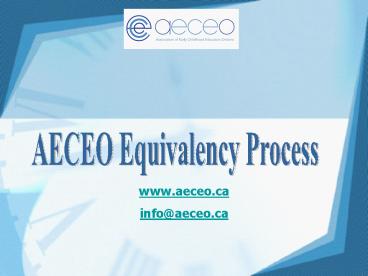AECEO Equivalency Process - PowerPoint PPT Presentation
1 / 23
Title:
AECEO Equivalency Process
Description:
Relevant education & training. Relevant work experience. College English language level fluency ... Child Studies, Bachelor of Arts program from an Ontario ... – PowerPoint PPT presentation
Number of Views:260
Avg rating:3.0/5.0
Title: AECEO Equivalency Process
1
AECEO Equivalency Process
www.aeceo.ca info_at_aeceo.ca
2
Routes to Early Childhood Education Credentials
Community College ECE programs
CECE approved post-secondary program list
LAFESEO
AECEO
ECE Diploma
Letter of Equivalency
College of Early Childhood Educators
3
(No Transcript)
4
AECEO Equivalency Benchmarks
- Ministry of Training, Colleges and Universities
ECE diploma Program Standards outcomes - Relevant education training
- Relevant work experience
- College English language level fluency
- Demonstration of knowledge of ECE field
- Completion within 2 years of part time studies
(Page 5 of EH)
5
Steps to Application Process
- Step 1 Obtain an equivalency application and
handbook - Step 2 Attend Information Session or arrange for
Intake Interview - Step 3 Submit completed application with
required documents - Step 4 Write Knowledge of ECE Field Assessment
Exam - (scheduled quarterly)
- Step 5 Under Assessment (6-8 weeks)
- Step 6 Fulfill Course Requirements (up to 2
years) - Step 7 Obtain Letter of Equivalency Certificate
(2-3 weeks)
6
DOCUMENTATION REQUIRED
- Copies of Official Diplomas
- Copies of Official Transcripts
- (3) Documentation of Teaching Hours/Work
Experience (verification of employment role,
responsibilities, age group, length of employment
eg. Resume, reference letters, job descriptions) - (4) Proof of Name Change (if applicable)
- (5) Proof of language fluency
- (6) Demonstration of knowledge
7
- Two Routes to Equivalency for Internationally
Trained Early Childhood Educators - Access to the Early Childhood Education Field in
Ontario Bridging Program - Individualized Model
7
8
Access to the Early Childhood Education Field in
Ontario Bridging Program
- Internationally trained
- Early Childhood Educators
9
Eligibility Criteria
- Have a post secondary credential focusing on ECE,
Kindergarten or Elementary School from an
accredited training institution - Have relevant work experience in the field
- Meet an acceptable English proficiency language
level benchmark (CLB 7) - Satisfactory demonstration of knowledge of ECE
field
10
- Prescribed Training Model
- Post-secondary Courses
- ? ECE in the Canadian Context (Intro)
- ? Health and Safety and Nutrition
- ? Curriculum Theory
- ? Policy Advocacy and Legislation
- ? Practicum
11
Mentorship/Supports
- One on One Mentoring Program
- Membership to AECEO
- Access to members web resources (job posting,
forums, weblink resources, e-bulletins) - Networking opportunities
- Volunteer opportunities
- College supports
- Academic and Registration Counselling
- AECEO Support
- Settlement Services
12
- Bridging to Employment
- Job Preparation Seminars
- - Resume, Interview skills
- Meet and Network with ECEs
- Professional Development Sessions
- Provincial Conference participation
13
- Individualized Training Model
- For those individuals who do not meet the
eligibility benchmarks for the prescribed model,
one or more of the following prescriptions may be
applied - Referral to language classes/courses
- Additional ECE courses assigned or
- Referral to alternative means of obtaining ECE
credentials through recognized training
institution
14
- Canadian trained
- Early Childhood Educators
14
15
- Eligibility Criteria
- Have a relevant post secondary credential from an
accredited training institution - Have relevant work experience in the field
- Satisfactory demonstration of knowledge of ECE
field
16
- Canadian Trained
- Prescribed Training Models
- Primary Education, B.Ed/Child Studies, BA
- Eligibility criteria
- Graduate of a concurrent or post graduate Primary
Education, Bachelor of Education
degree/certificate from a recognized Ontario
University or - Graduate of a Child Studies, Bachelor of Arts
program from an Ontario University, and - Relevant work or placement experience
17
Primary Education, B.Ed/Child Studies, BA
- Learning prescription
- Administration and Legislation
- Health, Safety Nutrition
- Observation
- Curriculum Development(Infant/Toddler)
- Field placement in an infant/toddler setting
18
- Child and Youth Worker or Social Service Worker
- Eligibility criteria
- Graduate of Ontario Community College Child and
Youth Worker or Social Service Worker diploma
program, and - Relevant work or placement experience
- Learning prescription
- Administration and Legislation
- Health Safety and Nutrition
- Curriculum Development I II
- Philosophy of ECE
- Observation
- Field placement in an infant/toddler setting
19
- Individualized Training Model
- For those individuals who do not meet the
eligibility benchmarks for the prescribed model,
one of the following prescriptions may be
applied - Additional ECE courses assigned or
- Referral to alternative means of obtaining ECE
credentials through recognized training
institution
20
References Resources
- Ministry of Children and Youth Services (MCYS)
http//www.children.gov.on.ca/ - College of Early Childhood Educators (CECE)
- http//collegeofece.on.ca/
- Ministry of Training Colleges and Universities
(MTCU) - http//www.edu.gov.on.ca/eng/tcu/
- (ECE Apprenticeship, Colleges of Applied
Arts and Technology) - L'Association francophone à l'éducation
desservices à l'enfance de l'Ontario (AFESEO) - http//www.afeseo.ca/
21
EQUIVALENCY FEES
22
Questions and Answers
Provincial Office 416-487-3157
1-866-932-3236 (Ont. Toll free)
Fax 416-487-3758 Email info_at_aeceo.ca 40
Orchard View Blvd Ste. 211, Toronto, ON (Yonge
Eglinton) Intake Coordinators Catherine Lundy,
ext. 28 clundy_at_aeceo.ca Rylee Crawford, ext. 29
rcrawford_at_aeceo.ca
23
- ________ ___ ______
Other Access to ECE field in Ontario Bridging
offices Hamilton Ahmed Mohammed
amohammed_at_aeceo.ca 905-575-1212 ex.
4469 135 Fennell Ave West (Mohawk College),
Suite E06A Hamilton ON, L8N 3T2 Fax
905-575-2414 Ottawa Velinka Nevrencan
vnevrencan_at_aeceo.ca 613-727-4723 ext.
2248 c/o Algonquin College, 1385 Woodroffe
Avenue, Block K, Room 117, Ottawa, Ontario, K2G
1V8 Fax 613-727-7169































